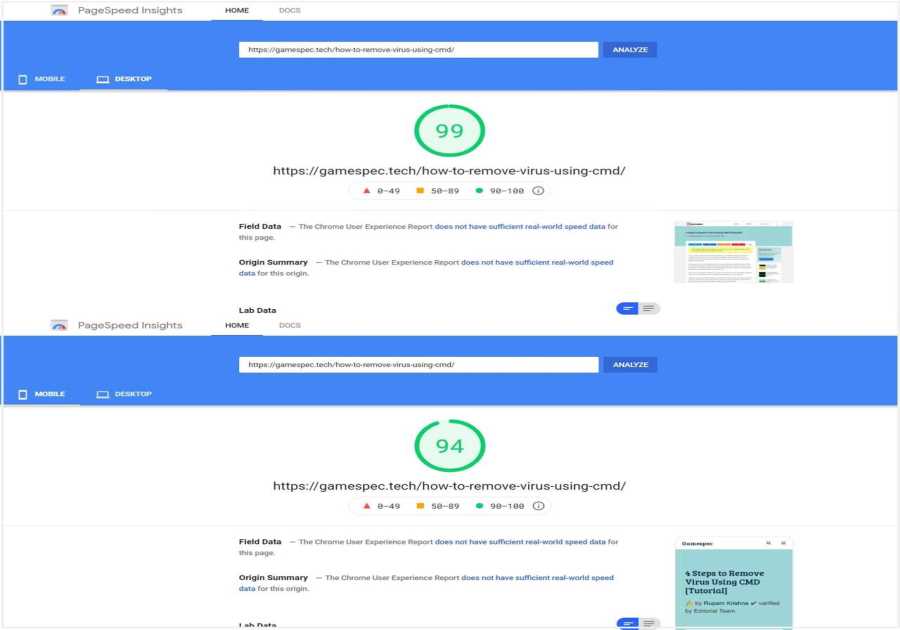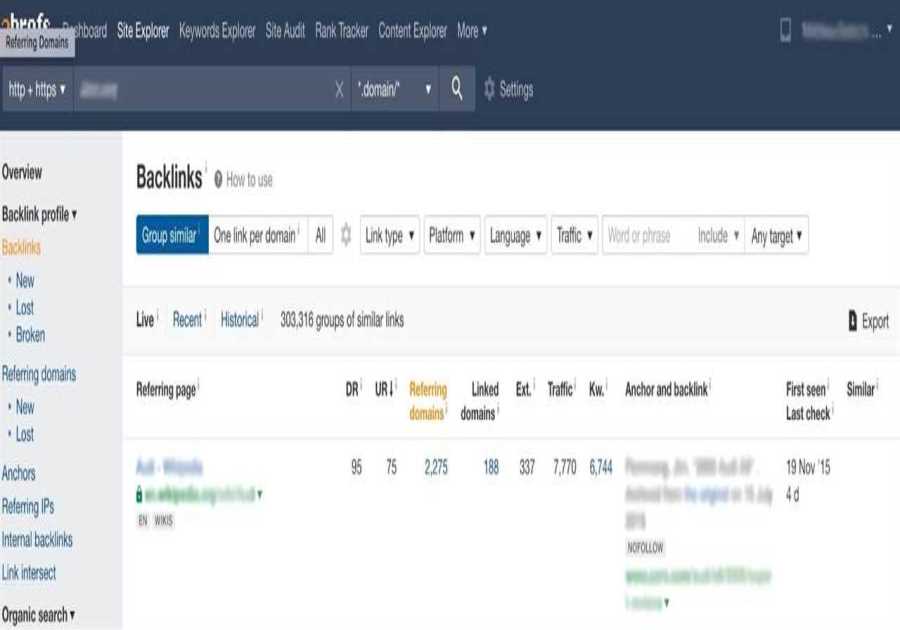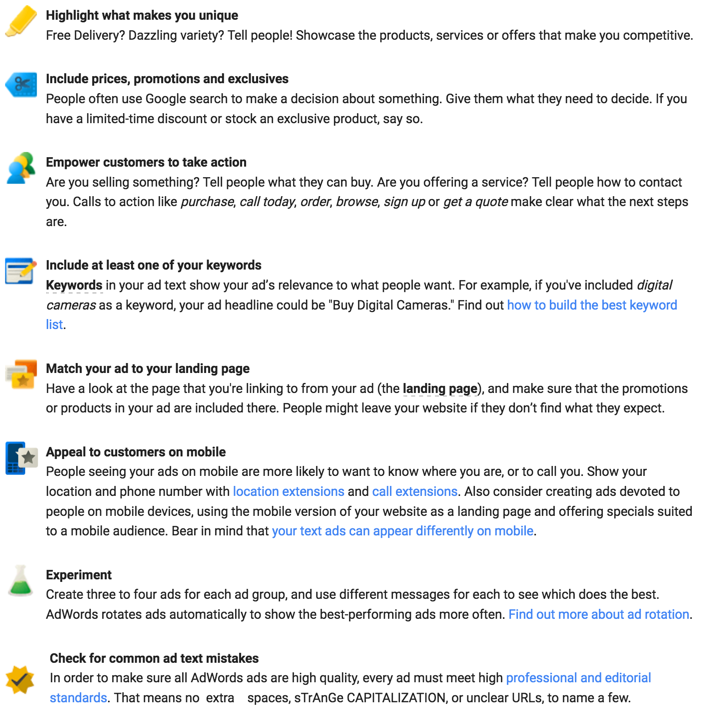

Google Search Campaigns are one of the most popular forms of online advertising.
If you’ve always wanted to run a Google Search Campaign of your own but didn’t know how this article will help you get started.
Even if you don’t know what a Google Search Network ad is, know more than enough to run a profitable Search Campaign of your own.
Let’s begin!
What are Google Search Network Campaigns?
Chances are, if you’ve used the internet, you’ve come across advertisers who are running Google Search Campaigns.
Google Search Campaigns allow for you to display advertisements in the search listings of a Google Search.

This is useful when you consider that Google processes more than 4 billion searches per day.
Another benefit of Google Search campaigns is you can pick the keyword that triggers your search and display ad.
For example, if you’re selling ‘fishing rods,’ you can decide to only show your ads when someone types the word ‘fishing rods,’ into Google.
Depending on how well your ad is optimized, and how much you’re bidding for your ad, you can influence how high your ad shows in the search network listings.
Google Search ads can also show up on a variety of other websites and apps.
Lay the Groundwork for Your Google Search Network Campaign
Before you run a Google Search campaign, you need to do some groundwork and develop a plan for your ad group.
Running a Google Search campaign can cost a lot of money and, if you don’t plan ahead, you’ll end up running ads that don’t generate an R.O.I. – while losing a lot of money in the process.
On top of that, if you fail to plan ahead, your conversion rate will be a lot lower than the average click-through rate of 3.17 percent.

So, what do you need to think about, when developing a Google Search Campaign plan?
One factor that you should pay attention to are the keywords that you’re going to be targeting.
Choose the Right Keywords to Target
The keywords, rather than image or text ad data, you target are arguably the most important factor when running a Search campaign.
After all, the keywords you select can influence how much your campaign is going to cost, but also the likely success of your search and display campaign.
Why?
Let’s first take a look at why keywords influence the success of your campaign.
Let’s continue with the example of ‘fishing rods,’ from earlier.
The success of your campaign is going to depend on your ability to accurately identify keywords with ‘buyer intent
In layman’s terms, that means keywords people type into Google when they’re actively looking to buy something.
What keyword do you think is going to drive better results when running a Search Campaign on Google.
‘Buy fishing rods’ or ‘fishing rods’?.
Odds are, it’s going to be, ‘Buy fishing rods.’
Those people are the ones who are looking to purchase something right now.
People just typing in ‘fishing rods,’ might still be in ‘research mode.’
It can also be a good idea to run a display network campaign based on a specific product or model name.
Again, this is because if someone is searching in relation to a specific product, there’s a good chance that they’re looking to buy – as opposed to the intent of someone who just runs a generic search.
When it comes to identifying keywords that are going to generate positive R.O.I., you don’t have to rely on guesswork.
That’s because you can use something known as the Google Keyword Planner tool.
This tool let’s you know what keywords people are typing into Google, in relation to a specific topic and getting search results.
It also let’s you know which keywords cost the most ‘per click,’ and how much competition there is, too.
Note: The keywords that cost the most tend to let you know which keywords are the most profitable.
Remember, Google Ads work using auction mechanism.
The price of ads rise, depending on who’s willing to pay the most for any one display ad.
If marketers are willing to outbid each other to a high degree, there’s a good chance that it’s because they can afford to bid so highly, as they have confidence that the ad will still generate a positive R.O.I. – in spite of the high bid.
This is all because high value keywords with buyer intent tend to convert much better than keywords that don’t represent buyer intent.
For example, if you pick a targeted keyword that signals buyer intent, you might be able to convert 1 in every 5 people that image ad click.
This is opposed to converting 1 in every 50 for a keyword that is less targeted and lacks buyer intent.
In a situation like that, it’s easy to see how a $2 CPC keyword might prove more profitable than a $0.50 CPC keyword.
Of course, this is all assuming that your landing page is adequately optimized – something we’ll touch on later.
Knowing that, let’s take a look at how you can use the Google Keyword tool to come up with keywords for your ad group.
First, head over to the Keyword Planner.
Once there, select “Dkiscover new keywords.”
Then, input a basic keyword that’s related to what you’re looking to sell.
So, in my case, I’ve entered ‘fishing rods.’

Upon doing so, I’m presented with the following page.
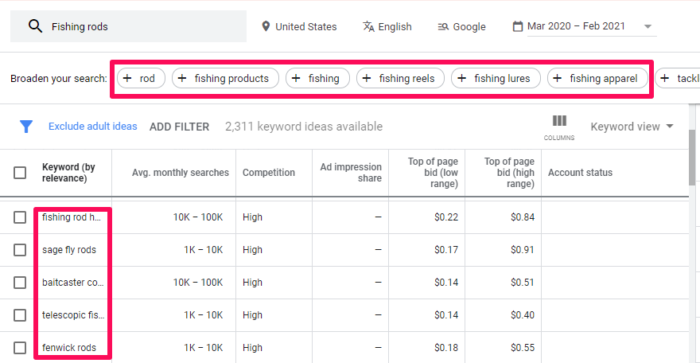
This page can be a little bit overwhelming at first, so let’s break it down.
The list at the tops shows related words I might want to consider.
Below that, you’ll notice that I’ve highlighted the tab called ‘Keyword by relevance’
This is essentially where Google has grouped search and display keywords into topics.
Each keyword also has its own ‘Avg. monthly searches,’ figure. This helps us identify high-volume keywords that could potentially provide a lot of traffic volume.
You can also see the top of page bid, which is how much we can expect to pay to hit the front page.
The competition tab tells us how many other people are likely bidding for the same words.
As you can see, all these terms have high compeittion, which means it’s likley going to cost quite a bit to run those ads.
This isn’t necessarily a bad thing — those keywords may also generate a pretty high ROI.
You might notice also, however, that a lot of these keywords aren’t that useful for people who are in the business of selling fishing rods.
As a result, it can be helpful to click through the ‘Groped view,’ option on the right sidebar, which groups related keywords together. Click on the carrot under each group and you’ll see more related terms.
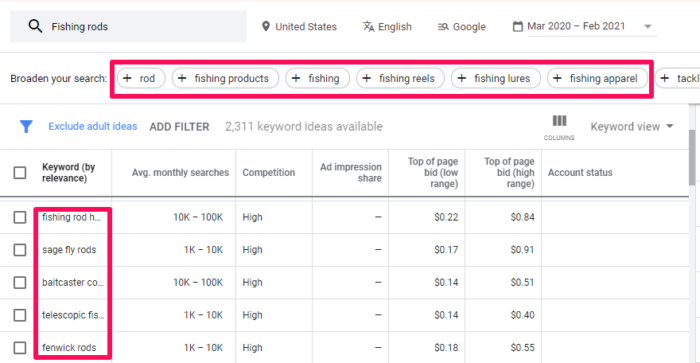
You’ll now notice that a lot of the ‘Ad Group Ideas’ and ‘keywords’ are more relevant and provide much more in the way of keywords with ‘buyer intent.’
In any case, what you’ll want to do after reviewing these keywords is to jot them down. You might even want to download them, by clicking on the ‘Download’ button.
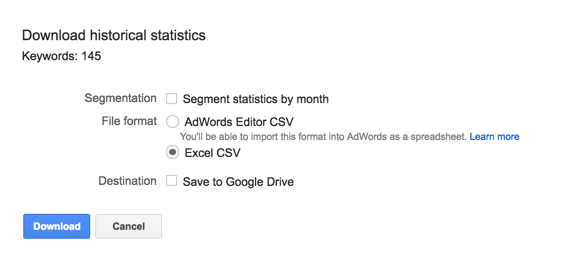
You can also use Ubersuggest to find keyword ideas. It is helpful for finding content ideas as well as keywords for Google Search Network Ads.
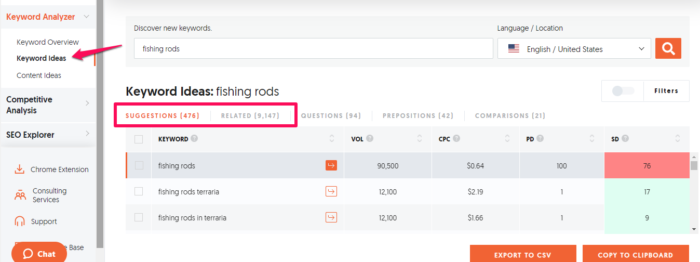
Pay attention to the “suggestions ” and “related” tabs to get more ideas.
Make Sure Your Landing Page (or Website) Meets Google Guidelines
Once you’ve identified some worthwhile keywords, you’ll then want to take a look at the webpage you’re sending ad traffic to make sure it is well-optimized.
If you’re sending traffic to a landing page, make sure that your landing page is compliant with the guidelines Google provides
Even if you’re sending traffic to a normal webpage, ensure that the page in question follows the guidelines.
Google disabled 780 million ads in one year due to policy violations – you don’t want to be part of that statistic!
Now, let’s take a look at how you can set up a campaign.
Setting up a Google Search Network Campaign
Log into Google Ads and then click on ‘+ Campaign.’
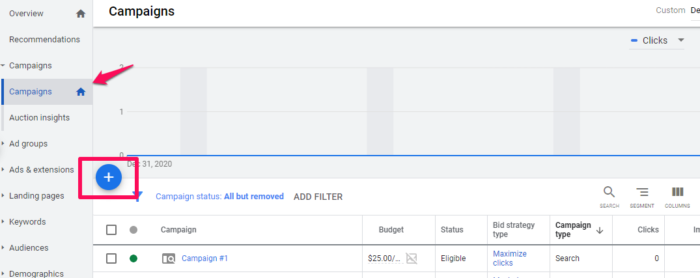
Set a Goal for Your Google Search Network Ad
Then, select your goal. Google offers several options including sales, leads, traffic, and brand awareness. To stay with the fishing pole example, I’ll pick “sales.”

Then, select a campaign type. Since we want to show up in Search, choose “Search.”
Next, choose what action you want users to take. Since we’re selling fishing rods, I’ll choose website visits.
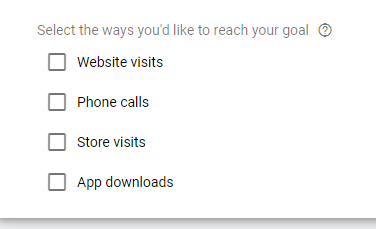
If you are a brick and mortar store, you’ll wan to choose “store visits” while an app company would choose “app downloads.”
Name Your Campaign
Now give your campaign a name. Make it something that is easy to remember and descriptive.
You can also choose the “Display Network” option, which will display your ad on partner sites across the internet.
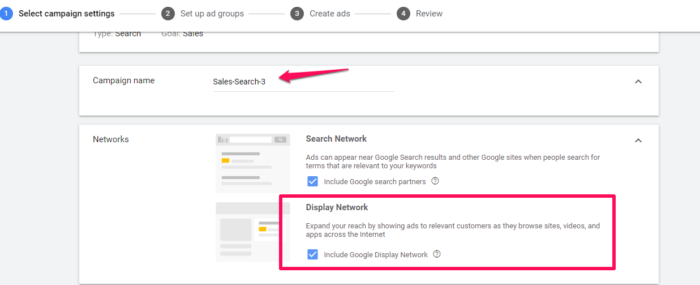
If you want to only show up on search, make sure you untick ‘Display Network.’ This will ensure the quality of your traffic is high, as clicks will originate only from searches that take place directly on Google.
Set Your Location & Language
You then have the ability to choose a ‘Location’ for your ad. Pick whatever is relevant to your offering and circumstance. If you are online, you might choose all countries and territories, but there’s likely a smaller audience you can target.
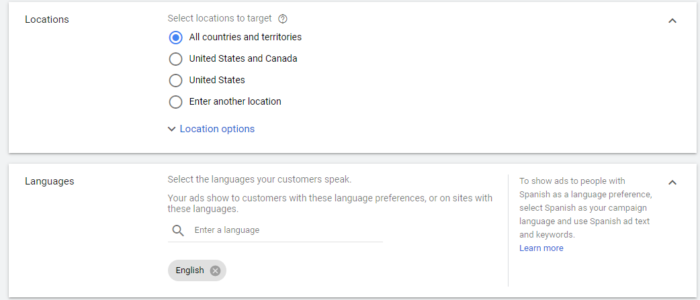
If you’re advertising in a foreign country, pick ‘English’ as the language, so that you’re still showing your ads to people who find them relevant.
Choose Your Audience
Now choose who you want to show your ads to based on interests.
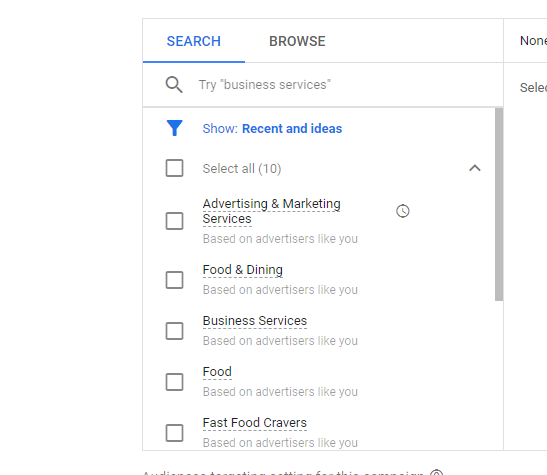
Set Your Budget
You can then adjust your budget and bidding.
If you’re new to Google ads, you might want to pick the ‘Maximize conversions’ option.
Don’t be too worried about what you pick here, as you can always adjust your bidding options later.

The budget section dictates how much you’re going to be spending, per day, on your ads. Your ads will never go over this daily spend limit.
You can experiment with the ‘Ad extensions’ section, once you have a bit more experience with search campaigns.

For now, however, just click on ‘Save and continue.’
Create Your Ad Group
You then get the chance to set up your Ad Group, which are one or more ads with a similar target.
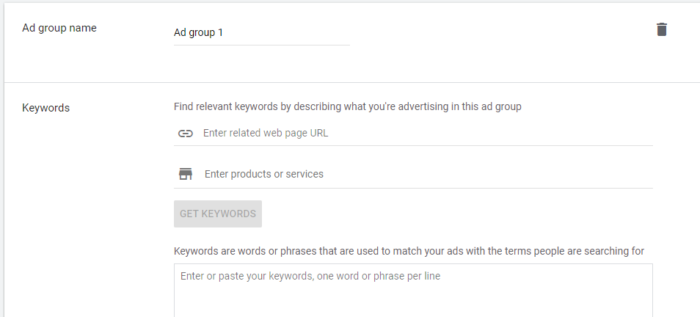
You can obtain keyword suggestions here, by typing in the URL of your landing or other page where you’re sending traffic to.
However, it’s arguably better to come up with your keywords using the display network strategy we went through earlier.
When typing in your keywords, it’s important that you pay attention to ‘Match Types.’
What are Match Types and Why Do They Matter?
Match Types influence the ‘kind of keywords’ that trigger your ad or entire ad group.
If you pick ‘Exact match,’ your ad will appear only when the exact keyword or phrase you have provided is entered into Google Search.
If you pick ‘Broad match,’ your ad will appear for a variety of keyword variations that are typed into Google Search.
Exact Match is often the best option for people who are just starting out with Adwords to get search network traffic.
Below, you’ll find a great explanation, in terms of the different match types.
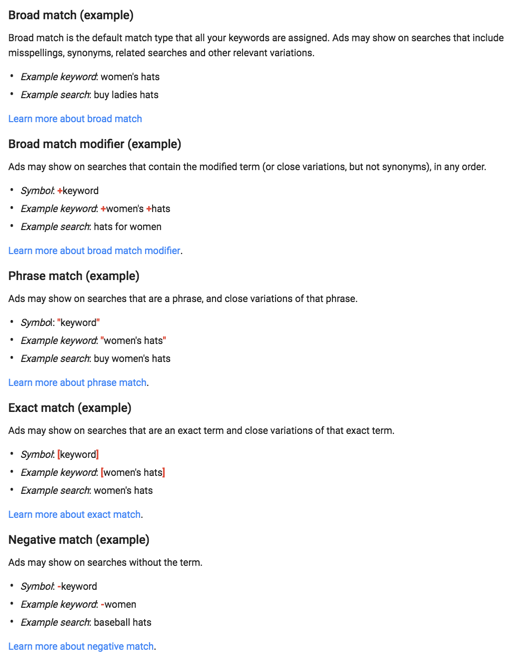
Create Your Google Search Network Ad
Now it is time to create your ad.
Creating effective copy for your search and display ad is something that takes a lot of skill.
Start by adding the URL you want your ad to go to, then click “view ideas” to get suggestions.

Wordstream offers a ton of great advice on how to create great ad headlines.
Here are some more tips from Google:
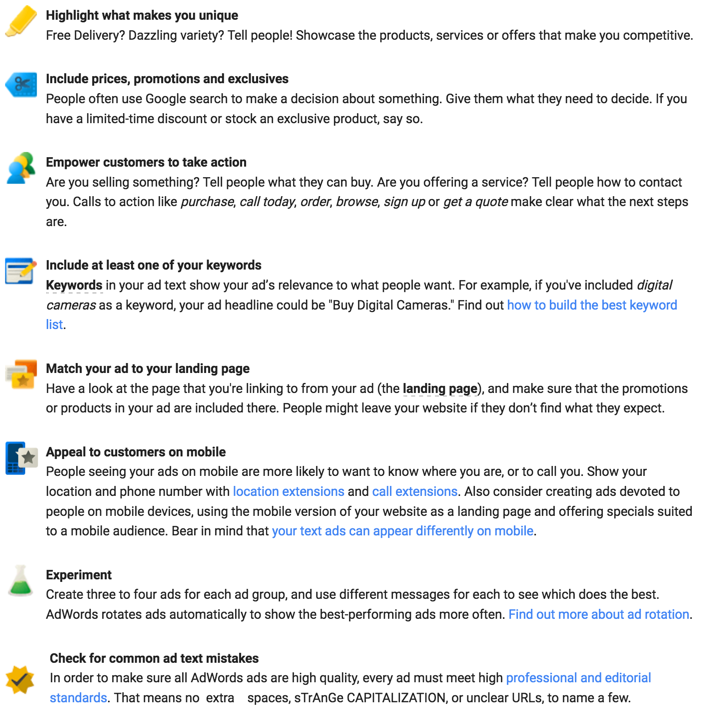
If you bid for a certain keyword, make sure that your ad copy contains that keyword. This makes your display ad seem more relevant and the matching of the two will improve clicks.
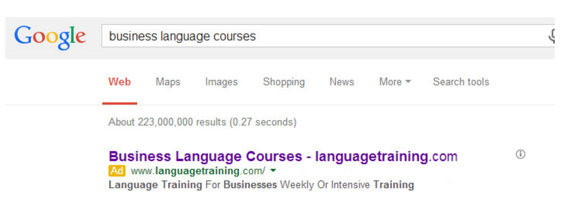
You also need to make sure that your ad headlines match your landing page headlines – I briefly touched upon this above.
Optimizely found that they could improve conversions by 39.1%, by matching landing page headlines with ad headlines.
Below shows how Optimizely set up their campaigns, initially.
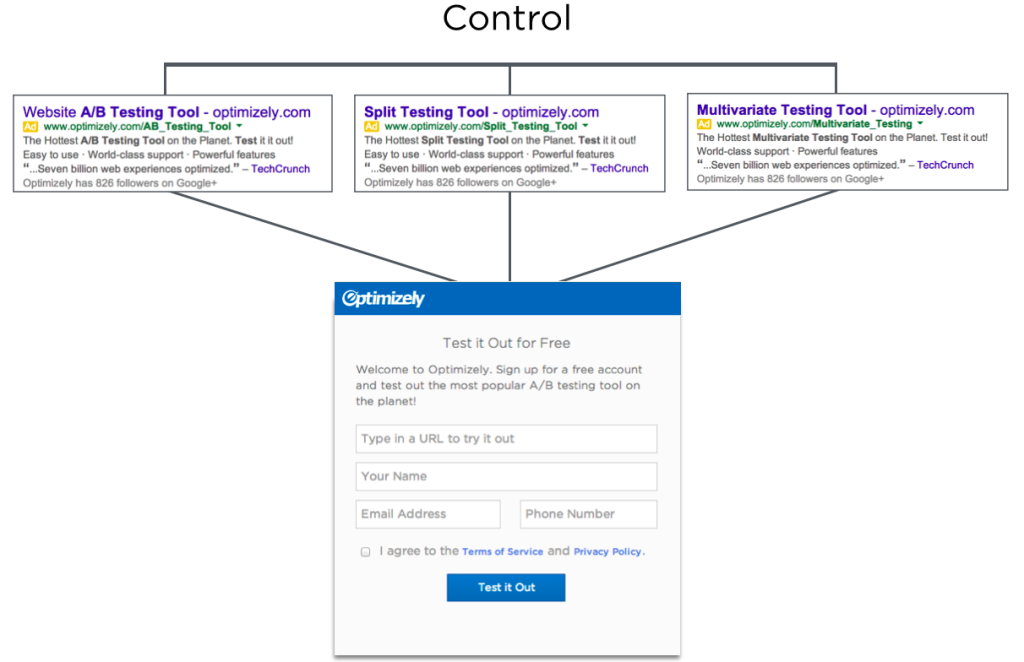
The next image shows how Optimizely adjusted their ads and landing pages in order to improve search network conversions.
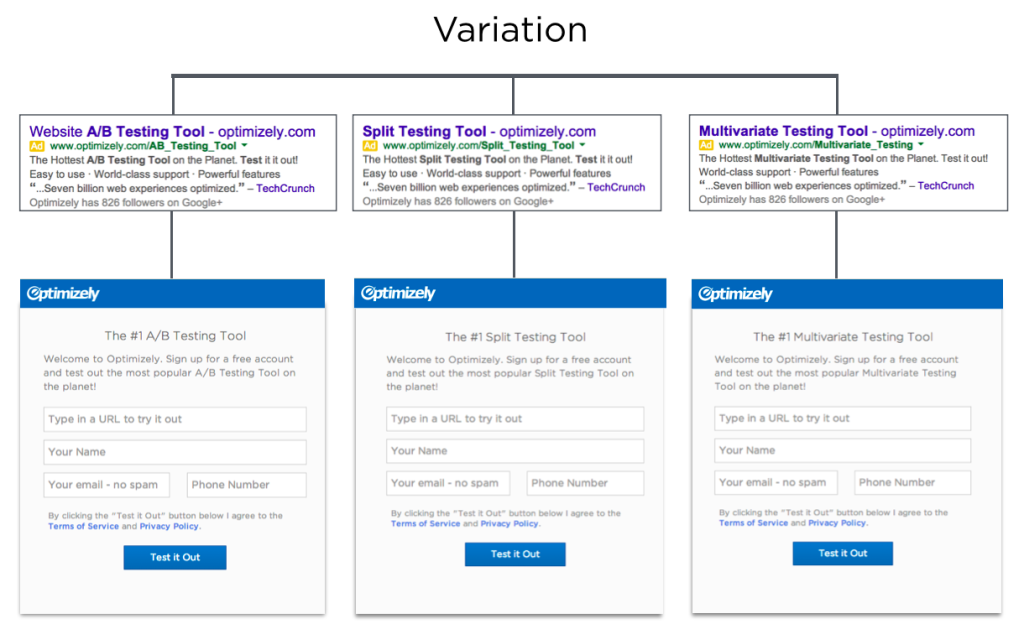
Aside from reading more on the topic and practicing, studying other ads can be a great way to improve your skills.
Pay attention to the “Ad Strentght” circle in Google Ads, it will give you an idea if your ads are likley to do well.
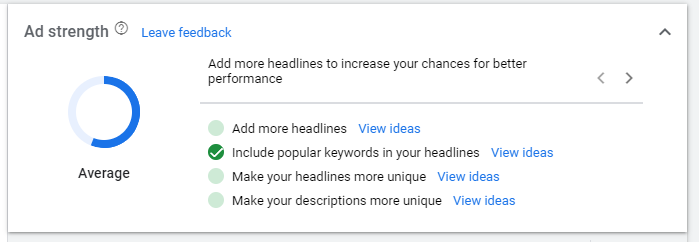
Keep an eye out for appealing ads, as you’re using Google on a day-to-day basis. ‘Screenshot’ these ads and keep them in a ‘Swipe file
You can then use these ads for inspiration, when running your own campaigns.
You can also use a tool, like SpyFu, to find competitor ads that have been running for a long time.
If an ad has been running for a long time, there’s a good chance that the marketer running that ad is turning a profit – after all, they’ve found a way to fund that ad for a long period, so it’s most likely profitable.
Once you’ve created your ad copy, you then have the chance to review your campaign.
Once you click ‘Save and finish,’ you then have to wait for Google to approve your campaign.
If you ever want to adjust the bidding strategy for your image ad campaigns, you can do that by going into the ‘Settings,’ of your campaign.
If you bid high, there’s a good chance that you’ll appear higher in the search listings.
Appearing high in the search listings is worth it, when you consider that the top three listings on the first search results page earn 41% of the clicks
Conclusion
If you’ve never run a Google Search Network Campaign before, you’re probably excited to get one going now, after having read this post.
But you need a plan of action, if you want to ensure that your ads are going to generate a return on investment.
In this post, we’ve examined how you can find the right keywords, so that you can improve the odds of having a successful search and display campaign. We also explored how you can write effective ads that will get people to click on them.
Now that you how to get started, why not get the ball rolling and see what’s possible for your business when using Google Search Network ads? If you need more tips or want to optimize your ads, check out this complete guide to managing Google Ads.
Best of luck!
Do you have any tips that you can share in relation to setting up a profitable Google Search Campaign?
By: Neil Patel
Title: How to Set up a Google Search Network Campaign (The Right Way)
Sourced From: Original article available: neilpatel.com/blog/how-to-set-up-a-google-search-network-campaign-the-right-way/
Published Date: 2021 03 23



